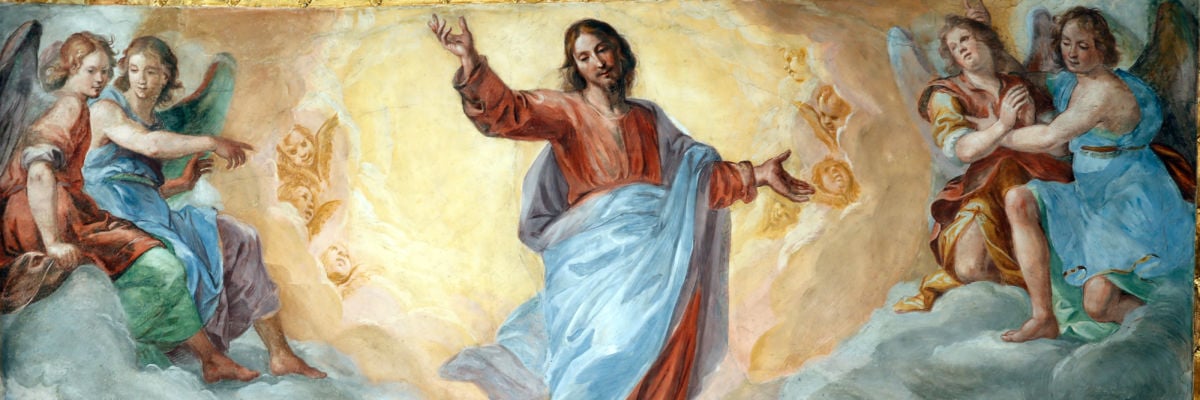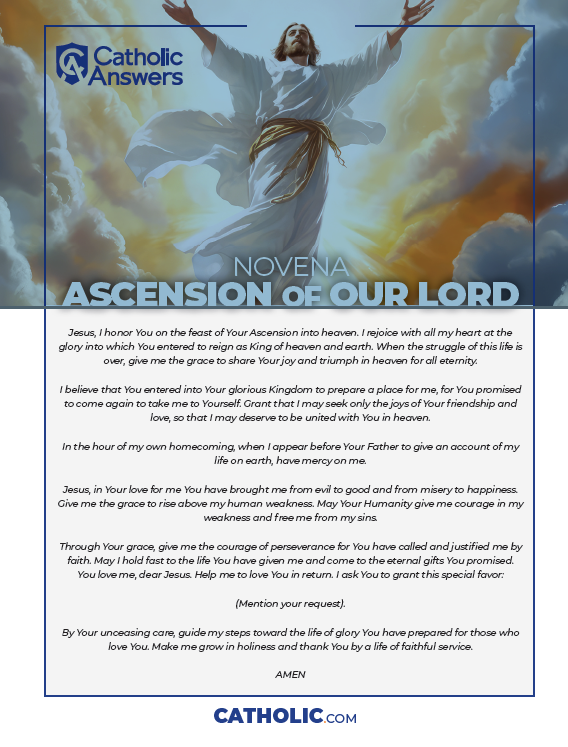
Feast of the Ascension of Jesus
The Feast of the Ascension of Jesus, celebrated forty days after Easter, commemorates the moment when the risen Christ, in the sight of his apostles, ascended bodily into heaven (Acts 1:9-11). It marks the completion of his earthly mission and the beginning of his exaltation at the right hand of the Father, where he intercedes for us as our eternal High Priest. The Ascension is a reminder that heaven is our true home and that Jesus, fully God and fully man, has gone before us to prepare a place for us in the Father’s house.
When is the Feast of the Ascension of Our Lord?
In 2025, the Catholic Church will celebrate the Feast of the Ascension of Jesus on Thursday, May 29, 2025. The Church celebrated the Feast of the Ascension 2024 on Thursday, May 9th. This solemnity occurs just forty days after Easter Sunday, and thus is the culmination of Jesus’ time on earth with his disciples (Acts 1:1-10-11). In some dioceses, especially in the United States, the solemnity may be transferred to the following Sunday (June 1) to allow for broader participation among the faithful. This feast is a holy day of obligation, meaning that, unless legitimately excused or otherwise dispensed (CCC 2181), Catholics need to participate in Mass to commemorate how Jesus ascended into heaven, completing his earthly mission.
The Biblical Foundation: Jesus’ Return to Heaven
The Feast of the Ascension, also known as Ascension Thursday, commemorates the moment when the Lord Jesus lifted up into heaven, as his disciples witnessed forty days after his Resurrection. Luke 24 and Acts 1 provide the clearest accounts of this event. Scripture tells us that, after appearing to his followers over forty days, Jesus raised his hands and blessed them. Then,
“while he blessed them, he parted from them and was carried up into heaven. And they worshiped him, and returned to Jerusalem with great joy” (Luke 24:50–52).
The Mount of Olives, just outside Jerusalem, is traditionally believed to be the site of this event. A cloud hid Jesus from their sight, symbolizing the mystery of his divine presence (Acts 1:9-11). This moment marked Christ’s return to heaven as the Incarnate Word, the risen God-man with a glorified human body and soul where he now reigns at the right hand of God the Father (Heb. 1:3-4; 1 Pet. 3:21-22).
Mary Magdalene and the Witnesses to the Risen Christ
The days leading up to the Ascension are full of wonder and hope. After Jesus rose from the dead, he appears first to Mary Magdalene and then to the apostles. These post-resurrection appearances are key to the Church’s proclamation that Jesus Christ rose from the dead on the third day, just as he foretold (Matt. 16:21).
A few common questions arise, e.g., how many saw Jesus ascend? Scripture indicates that the core group of his disciples, particularly his apostles, were present (Acts 1:2-3). The Ascension was not only a miraculous event, but Jesus, just prior to his ascent, also reaffirms that his apostles are to evangelize the whole world (Acts 1:8; cf. Matt. 28:18-20). So he prepares them for the coming on Pentecost of the Holy Spirit, who will empower the Church in fulfilling her mission (Acts 2:1-4).
Theological Meaning of the Feast
The Catholic Feast of the Ascension is not simply a historical remembrance. It holds deep theological significance. The feast day of the Ascension marks the exaltation of Christ and the completion of his earthly ministry. Jesus ascends not to abandon us, but to intercede for us at the right hand of God, and to make way for the promised Holy Spirit—the advocate or “Counselor”, (John 14:16, 26; 15:26)—on Pentecost.
Through his Ascension, Jesus affirms his divine authority and points to our ultimate destiny. Where he has gone, we hope to follow (John 14:1-3). When we ask, “Where is Jesus?” or “When does Jesus come back to earth?” we are expressing our longing for the Second Coming and the fulfillment of his promise to return and take us to heaven (Matt. 25:31-34, 46).
Download Our Free PDF Printable | Novena for The Ascension of Our Lord
The Fundamental Importance of the Ascension to the Biblical Story of the Mass
Our Protestant brothers and sisters argue that Jesus culminated his one sacrifice of Calvary on the cross, because he said, “It is finished” (John 19:30). However, while the suffering aspect of our Lord’s sacrifice did conclude with his death, Jesus and Scripture otherwise teach that his one sacrifice continues with his Resurrection and his Ascension.
On the day he rose from the dead, Jesus tells Mary Magdalene,
“Do not hold me, for I have not yet ascended to the Father; but go to my brethren and say to them, I am ascending to my Father and your Father, to my God and your God” (John 20:17).[1]
Indeed, Jesus’ one sacrifice of Calvary culminated in everlasting glory at his Ascension (Heb. 9:11-14; see 7:23-25;), the quintessential divine “gift which keeps on giving.” Jesus is the high priest of heaven (8:1-4; 9:23-24), whose one sacrifice is made present and offered sacramentally anew at each and every Mass, as heaven and earth become most profoundly one. It is an offering and partaking of Jesus’ body and blood that takes place according to the order of Melchizedek (Heb. 7:1-3), i.e., under the appearances of bread and wine and in a communion sacrifice which our Lord instituted at the Last Supper—the first New Covenant Passover (Luke 22:19-20; 1 Cor. 10:14-22; see Gen. 14:18-20).
Liturgical Observance in Catholic Churches
In Catholic churches around the world, the Feast of the Ascension Catholic Mass includes special Ascension Thursday readings, traditional hymns for Ascension Sunday, and prayers for Ascension that reflect the Church’s joy and hope. This feast, like Easter, invites the faithful to renew their belief in the risen and glorified Lord.
From Resurrection to Pentecost
The Ascension links Easter and Pentecost. After he rose from the dead on Easter Sunday (see “Christ has risen Easter Sunday”), and just before he ascends into heaven, Jesus instructs his disciples to wait in Jerusalem (Luke 24:44-52; Acts 1:4-9). Ten days later, on the fiftieth day after Easter, the Holy Ghost descends on the feast of Pentecost, fulfilling Jesus’ promise. So, how many days after the resurrection is Pentecost? The answer: fifty, inclusive of Easter Sunday. The Ascension, then, is the turning point between the Resurrection and the Church’s manifestation “to the world” on Pentecost Sunday (CCC 1076).
Common Questions and Misconceptions
Catholics often reflect on related scriptural topics, including:
- What time did Jesus rise from the dead? (Early morning on Easter Sunday, “while it was still dark” [John 20:1.])
- Jesus went to hell in scripture? (and/or hades [Rev. 20:13-14]/purgatory). (1 Peter 3:19 – He preached to the spirits in prison. If purgatory (1 Cor. 3:10-15), this “prison” was the holding place for just souls up until the gates of heaven were opened. St. Peter could be referencing instead—or, and also—the first experience of hell for damned souls, whom Jesus preaches to spiritually while his body remained in the tomb. See Jimmy Akin’s video response below.)
- When did Jesus rise from the dead? (On the third day after his death, i.e., inclusive of the day of his crucifixion, which is consistent with the numbering of three days of the ancient Israelites.)
These questions help deepen our understanding of the mysteries we celebrate during the Feast of the Ascension 2025.
Lift Up Your Hearts
The Ascension of the Lord 2025 is a time to lift our hearts to heaven and remember that Christ Jesus, our Lord, lives and reigns forever. It’s a call to remain faithful and joyful, like the disciples who returned to Jerusalem with great joy. As we await the coming of the Holy Spirit, we hold fast to the hope that we, too, are called to share in his glory.
Related Content
Podcasts
Why the Ascension and Pentecost Are Essential
Articles
The Ascension and the Church’s First Novena
Is the Ascension a Holy Day of Obligation?
Q & A
Why the Mass When There’s No Need for Sin Offering?
Books
20 Answers: Seasons and Feasts
Resources
[1] Because Jesus is both God and man, our heavenly Father is both eternal Father and God to our risen divine Lord.



